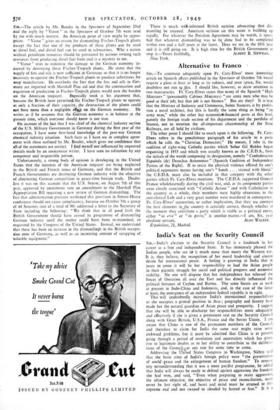Sul,—The article by Mr. Bender in the Spectator of September
23rd and the reply by " Viator " in the Spectator of October 7th were read by me with much interest. An American point of view might he appro- priate. " Viator " gives no reason for dismantling Fischer-Tropsch plants except the fact that one of the products of these plants can be used as diesel fuel, and diesel fuel can be used in submarines. Why a nation without petroleum resources should be prevented by nations owning such resources from producing diesel fuel from coal is a mystery to me.
" Viator " tries to minimise the damage to the German economy in- curred by destroying these Fischer-Tropsch plants. Ile states that the supply of fats and oils is now sufficient in Germany so that it.is.no.longer necessary to operate the Fischer-Tropsch plants to produce substitutes for soap manufacture. He overlooks the fact that the fats and oils in Ger- many are imported with Marshall Plan aid and that the continuation and expansion of production in Fischer-Tropsch plants would ease the burden on the American taxpayer. Especially weak is his argument that, because the British have permitted,-the Fischer-Tropsch plants to operate at only a fraction of their capacity, the destruction of the plants could not have more than a negligible ass on the German economy.. He writes as if he assumes that the German economy is in balance at the present time, which everyone should know is not true.
On account of the fact that I was chief of the chemical industry section of the U.S. Military Government in Germany during the first year of the occupation, I have some first-hand knowledge of the post-war German chemical industry situation. SuCh facts as I have are in complete agree- ment with those outlined by Mr. Bender, which gives me confidence that all of the statements are correct. I find myself not influenced by unproved denials made by an anonyanius writer. I have seen no refutation by any competent and responsible person.
Unfortunately, a strong body of opinion is developing in the United States that the interests of the American taxpayer are being neglected in the British and French zones of Germany, and that the British and French Governments are destroying German industry with the objective of eliminating German competition in peace-time foreign trade. Doubt- less it was on this account that the U.S. Senate, on August 5th of this year, approved by unanimous vote an amendment to the Marshall Plan Appropriation Bill requiring a new review of German dismantling. The fact that administration pressure weakened this provision in Senate-House conference should not cause complacency, because on October 5th a group of 44 Senators (out of a total of 96) addressed a letter to the Secretary of State including the following: " We think that in all good faith the British Government should have ceased its programme of dismantling German industry until the matter could have been re-examined, as requested by the Congress of the United States. Instead, we understand that there has been an increase in the dismantlings in the British occupa- tion zone of Germany, as well as an increasing amount of scrapping of valuable equipment." There is much well-informed British opinion advocating that dis- mantling be stopped. American opinion on this noint is building up rapidly. For whatever the Potsdam Agreement may be worth, it speci- fied that whatever dismantling was to be done had to be completed within two and a half years at the latest. Here we are in the fifth year and it is still going on. It is high time for the British Government to






































 Previous page
Previous page